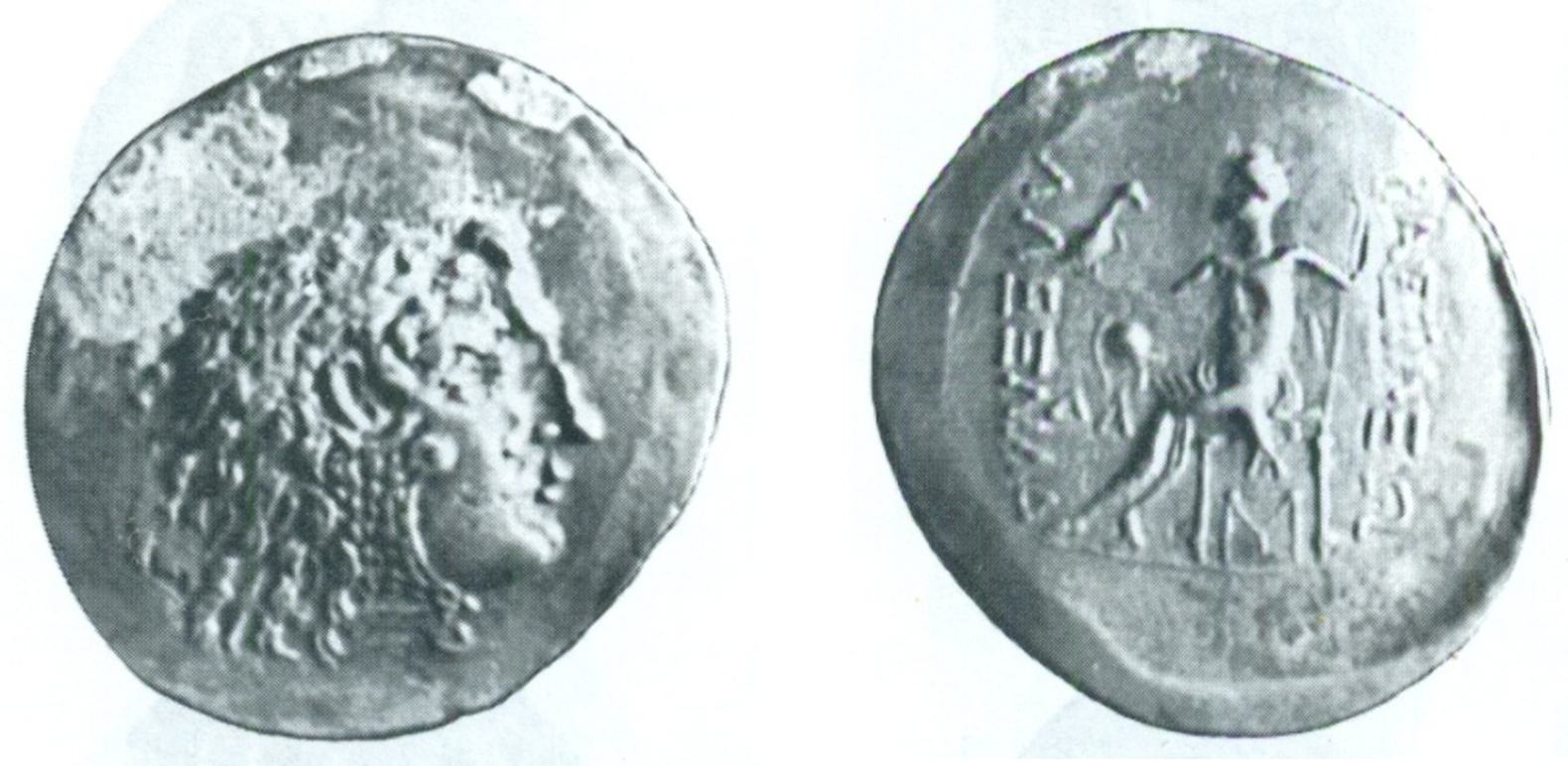3847 - Mesembria (Alexander the Great) (tetradrachm Heracles/Zeus) over Thasos (Dionysus/Heracles) (Veliko Tirnovo, HM, 121): Difference between revisions
From SILVER
No edit summary |
No edit summary |
||
| Line 18: | Line 18: | ||
|Denomination=tetradrachm | |Denomination=tetradrachm | ||
|Standard=Attic | |Standard=Attic | ||
|Coin series reference=Price 1991, n° 1047 ; Karayotov 1994 | |Coin series reference=Price 1991, n° 1047 ; Karayotov 1994, n° 295, O47-R134 ; MacDonald 2009, p. 213, n° 13 | ||
|Coin series web reference=http://numismatics.org/pella/id/price.1047 | |Coin series web reference=http://numismatics.org/pella/id/price.1047 | ||
|Overstruck mint=Thasos | |Overstruck mint=Thasos | ||
Revision as of 10:52, 17 May 2023
175 BCE - 125 BCE | BAΣΙΛΕΩ AΛΕΞΛΙΛΔ
Location/history
| Museum collectionMuseum collection: | Veliko Tirnovo, HM, 121. | |
Overstriking coin
Description
| ObverseInscription or printing placed on the obverse.: | Head of Herakles right, wearing lion skin headdress. | ReverseInscription or printing placed on the reverse.: | BAΣΙΛΕΩ AΛΕΞΛΙΛΔ (Greek) Zeus enthroned left, holding eagle and scepter. Under the throne, monogram (ΠΥ). In left field, Corinthian crested helmet and ΔΑ. |
Mint and issuing power
| MintIdentifies the place of manufacture or issue of a numismatic object.: | Mesembria | Ancient regionAncient region. | Thrace | Modern countryModern country: Bulgaria | AuthorityIdentifies the issuing power. The authority can be "pretended" when the name or the portrait of X is on the coin but he/she was not the issuing power. It can also be "uncertain" when there is no mention of X on the coin but he/she was the issuing power according to the historical sources: | Alexander III the Great (Argead king, 336-323 BC) |
Chronology
| FromIdentifies the initial date in a range assigned in a numismatic context. 175 BCE toIdentifies the final date in a range assigned in a numismatic context.. 125 BCE | hellenistic periodTime period of the numismatic object. |
Physical description
| MetalThe physical material (usually metal) from which an object is made.: Silver |
WeightWeight of the numismatic object (in grams). in grams: 16.916.9 g <br />16,900 mg <br /> | DenominationTerm indicating the value of a numismatic object. Examples: tetradrachm, chalkous, denarius.: tetradrachm |
|
| DiameterDescribes diameter of an object (in mm).: 4040 mm <br />4 cm <br /> | StandardStandard.: Attic | ||
References
| Coin referenceReference of the Coin: | Coin series referenceReference to coin series study: | Price 19911Price 1991, n° 1047, Karayotov 19942Karayotov 1994, n° 295, O47-R134, MacDonald 20093MacDonald 2009, p. 213, n° 13 | |
| Coin series web referenceCoin series web references: | |||
Overstruck type
Description
| ObverseInscription or printing placed on the obverse.: | ReverseInscription or printing placed on the reverse.: |
Mint and issuing power
| MintIdentifies the place of manufacture or issue of a numismatic object. ᵖ: | Thasos | Ancient regionAncient region. ᵖ | Thrace | Modern countryModern country: Greece | AuthorityIdentifies the authority in whose name (explicitly or implicitly) a numismatic object was issued. ᵖ: |
Chronology
| FromIdentifies the initial date in a range assigned in a numismatic context. toIdentifies the final date in a range assigned in a numismatic context.. | periodTime period of the numismatic object. |
Physical description
| DenominationTerm indicating the value of a numismatic object. Examples: tetradrachm, chalkous, denarius. ᵖ: | tetradrachm |
References
| Coin type referenceReference to coin series study ᵖ: |
Additional data
| Frequency of overstrikesFrequency of overstrikes: | Level of confidenceLevel of confidence of the identification: | ||
| RemarksRemarks: | over Thasos for Karayotov | ||
References
- ^ Price, Martin Jessop (1991), The Coinage in the Name of Alexander the Great and Philip Arrhidaeus: a British Museum Catalogue, 2 vol., Zürich-London, 637 p., 637 p., clix pl.
- ^ Karayotov, Ivan (1994), The coinage of Mesambria. vol. 1: silver and gold coins of Mesambria, Centre of Underwater Archaeology, Sozopol, 134 p. and 44 pl.
- ^ Macdonald, David (2009), Overstruck Greek coins: studies in Greek chronology and monetary theory, Whitman Publishing, Atlanta.

